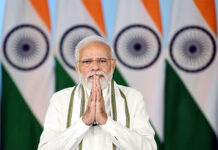
After the second wave of coronavirus outbreak and raising cases in India, Britain placed the toughest travel restrictions on the country on Monday, just hours after Prime Minister Boris Johnson canceled a trip to New Delhi.
In the House of Commons, Health Secretary Matt Hancock announced the change, revealing that 103 cases of the so-called Indian strain have been found in the UK, with the “vast majority” having “ties to foreign travel.”
Samples of the variant have been analyzed to see if it has any “concerning traits,” such as increased transmissibility or susceptibility to treatments and vaccines, he added.
Hancock announced that India would be added to Britain’s “red list,” prohibiting all arrivals from India except for UK and Irish nationals who would pay to stay in a government-approved quarantine hotel for ten days upon their return.
Johnson will not be able to fly to India next week as scheduled, according to the British and Indian governments, “in view of the present coronavirus situation.” Johnson and Indian Prime Minister Narendra Modi are expected to talk later this month and meet in person later this year, according to the report.
Johnson’s long-awaited journey will have been his first overseas trip since the coronavirus pandemic began more than a year ago. It was supposed to happen in January, but it was delayed due to an outbreak in the United Kingdom.
On Monday, India recorded a total of 273,810 new infections, the largest daily increase since the pandemic began. It currently has over 15 million infections under its belt, second only to the United States.
In the last 24 hours, the Indian Health Ministry recorded 1,619 deaths from COVID-19, bringing the total to 178,769. After the United States, Brazil, and Mexico, India has the fourth-largest number of deaths, despite having a significantly greater population.







